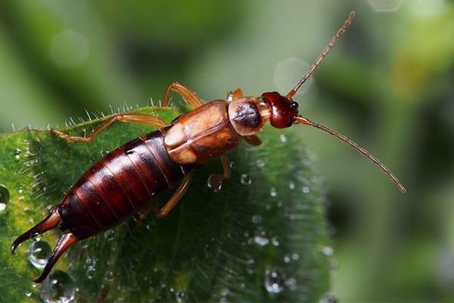When you are concerned about the impact of pests around your house, you may be constantly on alert for any insect invaders. As such, the discovery of a strange-looking bug with large pincers could send you into a minor panic.
However, before you have a complete meltdown from finding earwigs, you must get to know some of the facts about them. There are many myths and legends about this common household pest. Get to know more about earwigs and what you can do about them so you can handle the situation properly.
Don't Be Fooled by Their Name
The name "earwig" can certainly strike fear in the hearts of anyone with even a mild dislike of insects. And if you have seen Star Trek: The Wrath of Khan, you may even have an image in your head of earwigs burrowing into someone's ear and taking control of their brain.
Earwigs did indeed get their name from the myth that they crawled in people's ears and began feasting on their brains or laying eggs. However, both myths are falsehoods and have never once been scientifically verified. The truth is earwigs have little to no interest in people.
Appearances Can Also Be Deceiving
Not only is the name "earwig" misleading, but so is their appearance. The saying "never judge a book by its cover" can translate in the insect world to "never judge a bug by its pincers". Earwigs have large pincers that protrude from their flexible abdomens. But these frightening pincers are not as dangerous as they would seem. They are used as protection from predators like other insects, toads, and birds but would not normally break human skin. Earwigs are not venomous and their intimidating appearance is largely deceiving, as earwigs pose little to no danger to humans.
Why Earwigs Are Considered a Pest
While earwigs are not going to bite or crawl into your ear, they are still considered to be household and garden pests. This is due largely to what they do eat. Earwigs are omnivores, eating both plants and other creatures, but the main component of their diet is plants and leaves. They will also eat other insects and thrive in areas that are moist and full of decay, even feeding on mold.
The largest danger that earwigs pose to your home is in your landscaping and in your garden. Earwigs may eat away at your garden plants making it difficult for you to get a good yield on your vegetable, herb, and fruit plants. And, of course, no matter how understanding you are that insects are a part of the natural ecosystem, nobody wants an infestation in their home.
What to Do About Earwigs
To deal with earwigs inside of your house, you will not only want to contact a pest control company to exterminate the earwigs in your home, but you will also want to find the areas of your home in which they are entering. Seal up cracks and holes along the interior and exterior of your home, especially on the ground floor. You will also want to look for any areas of your home with leaking pipes or excess moisture. Earwigs are attracted to that type of environment and may be more likely to come into your home when you have those issues.
For earwigs in your yard and garden, the first step is to get rid of any leaf piles or areas of decay that earwigs might congregate. In your garden, you could do something as simple as putting a little petroleum jelly on your plant stems. Earwigs cannot climb up to the leaves in this case. You can also try attracting more birds to the area or setting traps with garden hoses as earwigs will gather underneath the hose and you can remove them from that area. Soapy water is enough to kill earwigs, but you do not want to pour soapy water into your garden because it is bad for plants as well.
Now that you better understand earwigs and how to get rid of them, you can contact your pest control company as soon as possible to help you out. The experts at Bugman Pest Elimination, Inc. will be glad to help as well, contact us today!
Schedule Your Free Inspection
Complete the form below to schedule your no-obligation inspection.

